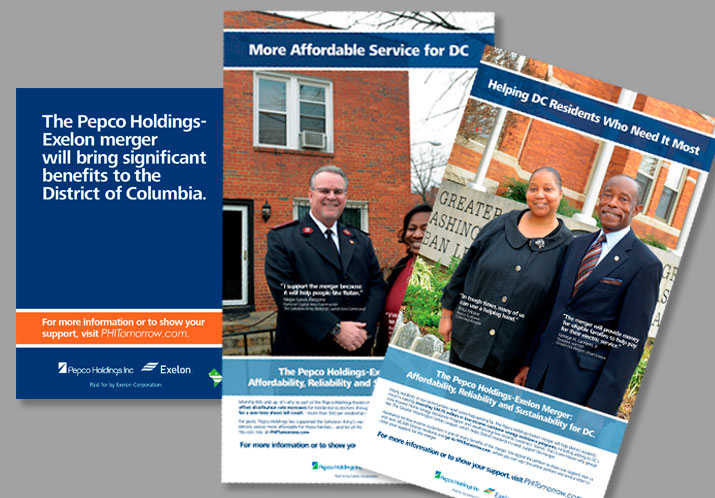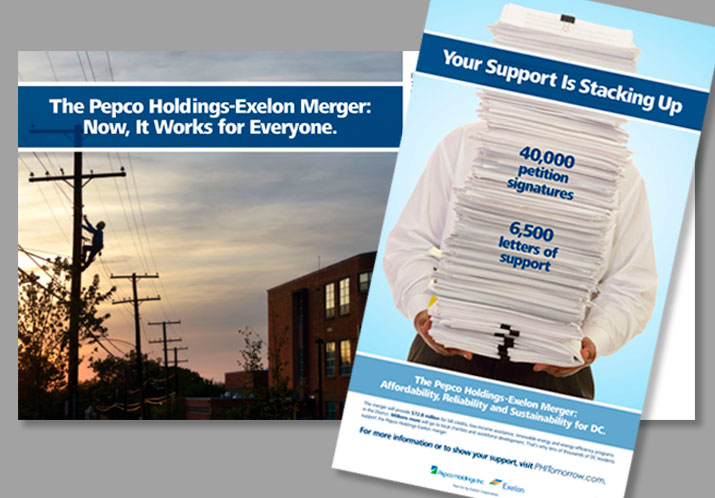Pepco Holdings, Inc.
Project Date: 2014 – 2016
Project Type: Mergers & Acquisitions Communications
Situation
The merger between Pepco Holdings, Inc. (PHI, NYSE: POM), and Exelon Corporation was a nearly two year process. The merger was hotly contested in the District of Columbia, where the political environment is alive on every corner. An added complexity was that the reputation of PHI’s Pepco utility was newly turned around after being named the “most hated company in America” not even three years before. The merger process included many phases and communications was at the center of each to ensure a successful announcement, approval process and transition into the newly combined company.
Strategy
For the announcement, we developed a confidential communications strategy that included customized and direct communication about the merger to the many PHI audiences: employees, shareholders, elected officials, media, retirees, and other key stakeholders. The internal announcement was the most elaborate, with a videotaped message from the PHI CEO that was shown at all facilities with all employees the morning of the announcement, and a live streaming video broadcast and Q&A forum later in the day with both the Exelon and PHI CEOs. Site hosts for the announcement were given talking points, FAQs and fact sheets to answer the many employee questions.
Throughout the lengthy merger approval process, the team supported the communications needs for four jurisdictions through collaborative development of talking points, presentations, fact sheets, brochures, press releases and advertisements. After the merger was rejected by the Public Service Commission of the District of Columbia, we developed an aggressive and targeted advertising strategy to help District residents understand the tremendous benefits the merger would bring. The campaign lasted six months and included radio ads, full-page print ads, digital ads, and direct mail pieces spotlighting residents and supporters who agreed the merger was too important to the District to fail.
Over the course of the two years between the announcement of the merger and the final approval, we also worked with Exelon to analyze and develop a new communications structure that would align with the Exelon utilities communications model. That process included the development of new organizational charts, job levels and job descriptions. In addition to redesigning the organization – for a second time – we worked collaboratively with our counterparts to develop all internal communications surrounding the merger so employees were fully informed of the approvals and other merger news, had their questions answered in a timely fashion and felt as though they were involved in the process. The internal communications included newsletters, internal emails, fact sheets, talking points, and a section of the Intranet dedicated completely to the merger, its benefits and the status of all approvals.
Results
The multi-faceted, complex nature of communications for this merger required a comprehensive yet flexible strategy. Working closely with the legal and regulatory teams, we aggressively executed the communications strategy and never let up during the two-year process. Specifically, the results included:
- Merger between Pepco Holdings, Inc., and Exelon Corporation was approved in all four jurisdictions, including an approval after being initially rejected by the DC Public Service Commission
- Developed numerous sets of talking points, FAQs and Q&A documents for internal and external use with employees, shareholders, elected officials, media, retirees, unions and other key stakeholders
- Orchestrated internal events with live streaming video to employees to announce the merger and introduce them to Exelon
- Led and directed an aggressive advertising campaign with over 30 radio and print ads, direct mail pieces and digital ads and posts that ran over six months and highlighted the benefits of the merger; including versions in Spanish
- Extensive analysis and reorganization of communications department to align with Exelon model; development and implementation of comprehensive and ongoing internal communications campaign throughout two-year process; successful transition of all communication projects to new leadership




